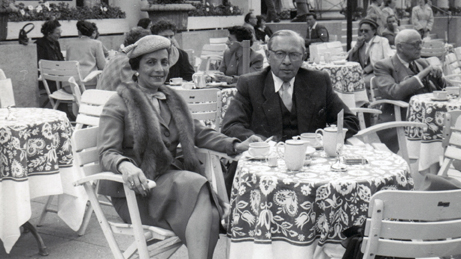
Gerda and Kurt Tuchler in THE FLAT (Tuchler/Goldfinger family Collection)
![]() The Flat starts as an ordinary family gathering, the type familiar to many of us, and turns into an extraordinary story. Director Arnon Goldfinger, a humanistic and diligent detective, delves into uncharted realms of personalities, psychology, and culture of 2oth century history. He unpacks and unravels secrets and lies of unexpectedly complicated people who astonishingly challenge stereotypes.
The Flat starts as an ordinary family gathering, the type familiar to many of us, and turns into an extraordinary story. Director Arnon Goldfinger, a humanistic and diligent detective, delves into uncharted realms of personalities, psychology, and culture of 2oth century history. He unpacks and unravels secrets and lies of unexpectedly complicated people who astonishingly challenge stereotypes.
Even as a youngster, Goldfinger sensed the irony in how his grandparents, Gerda and Kurt Tuchler, kept their apartment in Tel Aviv as if they were still grandly living in the Berlin they left in 1936. Like the Yiddish theater family of Goldfinger’s earlier documentary The Komediant (2000), they never fully adjusted to the new ways of Hebrew-speaking Israel.
The self-designated family historian, Goldfinger took along his camera to document the end of an era as he, his sisters, and mother cleaned out his widowed grandmother’s crammed apartment after she died at age 98. In the process, a pile of yellowed Nazi newspapers fell out of a bureau, featuring smiling photos of his grandparents. He pressed his mother to translate the story headlined “A Nazi Travels to Palestine” about their 1934 tour with the high-ranking SS Officer Baron Leopold Itz Edler von Mildenstein and his wife.
Goldfinger checks with historians about how the interests of Nazis and Zionists coincided to encourage German Jews to emigrate to Palestine. This resulted in a formal agreement between the Reich and the Jewish Agency of the World Zionist Organization that finagled the transfers of funds to get around the Jewish settlement quota restrictions in the British controlled territory. The two couples traveled for months together–two World War I veterans and their wives, one an official of the Zionist Federation of Germany, the other a high-level Prussian responsible for the National Socialists’ Jewish expulsion policies. Both enthusiastically promoted Palestine as the mutual solution.
As his family recoils, shrugs, and keeps busily throwing out more of their heritage, the director grabs out of their hands letters, lots of letters, and more souvenirs between the two German couples. He’s shocked to discover that their fond correspondence continued after his grandparents emigrated while the Final Solution enveloped family back in Germany—and even after the war! Goldfinger picks out the return address, places a phone call, and becomes even more surprised by the amiable voice of a woman delighted to hear from the family of her parents’ old friends, who she remembers well. He travels to Germany (schlepping his reluctant mother along on one trip), searches archives, talks to a helpful range of experts, and asks both families to remember and face facts.
So over the momentous decades, who knew how much about what was happening to whom? Who lied or who hid the truth, to each other and their children? Who did or did not help whom? And how could they? The more and more fascinating public truths and private revelations Goldfinger uncovers are tantalizingly confounding and irresistibly fascinating. (That von Mildenstein mentored and promoted Adolf Eichmann is just one of piece of evidence to mull).
Weaving illustrative newsreel footage and his archive findings in with pointed interviews, Goldfinger very effectively evokes life in each distinct period of his grandparents’ lives—prewar, the Holocaust, postwar capitalism—to find the heart of the mysterious German cultural equation that could allow two couples to bond stronger than the immensity of history that could keep them apart. I recently toured the huge Jewish Museum Berlin, and it didn’t come as close to explaining the ethos of German Jews as well as this film, which also chillingly punctures the amnesia of denazification. You have to see this unique documentary yourself to decide a question that’s haunted me since I first saw it at the Tribeca Film Festival: could these two German couples, the Jews and the Nazis, really have just liked each other despite everything?






Nora–
This is one of the most perspicacious reviews of the film I’ve read.
Thanks for giving more insights into both the film and the problems it raises.